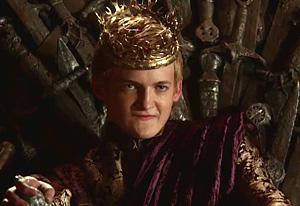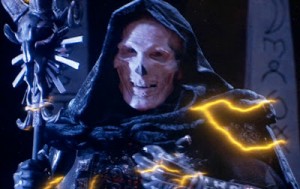 In D&D, kings are often statted up as high-level characters. How you level them says a lot about your D&D fantasy politics.
In D&D, kings are often statted up as high-level characters. How you level them says a lot about your D&D fantasy politics.
I’ve always tended towards the last approach, so there are plenty of level 1 kings running around in my game world. But this quote from Crescent Throne got me thinking:
“But why?” Zamia asked. “Why would any man—even a cruel man—do these things? What could he possibly gain?” “Power,” the Doctor answered without hesitation. “The same thing that a man gains when he murders one of his fellow men. The same thing that a ruler gains when he sends his armies to kill and die. Power and the promise of a name that will live forever.”
 Reading it, I thought, “It would be cool if there were some game representation of this ‘Powwah!’ that evil guys are always yammering on about. Like, by performing dark rituals, or merely by exercising political clout, you got some game benefit that made you more dangerous.”
Reading it, I thought, “It would be cool if there were some game representation of this ‘Powwah!’ that evil guys are always yammering on about. Like, by performing dark rituals, or merely by exercising political clout, you got some game benefit that made you more dangerous.”
As I thought about how to represent “power”, I discovered, as often happens when I re-examine a potential house rule, that the concept is already built into D&D. Levels.
What if the mere act of channeling power gave you a level minimum? Whatever his personal XP total, for instance, a king always has the HP, class features, etc. of at least a level 10 character. Channeling the eldritch might of some evil dimensional vortex gives you the abilities of a level 20 character – as long as you keep the vortex open.
Whoever holds the real power gets this benefit, of course. There are no level 10 babies. The regent is level 10 until the king is old enough to take the reins of power. This translates political struggle into D&D’s vernacular. Cersei and Joffrey are squabbling over who gets to act like they’re level 10.







I would point out that there’s an even more fundamental way the power of kings is built into the game: hirelings and henchmen.
King Joff doesn’t have to be 10th level, because the has the Kingsguard around him all the time – 7 high-level fighters, (theoretically) some of the best in the realm. He also has a literal army of hirelings – servants, men-at-arms, guards, city watch, etc. etc.
Money buys power in D&D in the same way it does in real life – it pays the salaries of people to do your work for you.
I like the way ACKS handles it: the ruler of a realm has to be of a minimum level for his rule to be stable. The minimum level increases with the size of the realm. For an empire like the Game of Thrones’ Seven Kingdoms of Westeros, it’s level 14. Things were stable under King Robert because he was a 14th level badass who fought his way across a land that George R. R. Martin says is the size of South America. Joffrey isn’t14th level, nor are any of the people vying to be his regent. So, the realm is in turmoil and rebellion. If Joffrey or his regent is able to restore peace and stability, it will be because they earned enough XP quelling the rebellion to reach 14th level, or because they let the realm break up into several independent realms that are small enough to be ruled by lower-level characters.
Nice rule. ACKS to the rescue!
Birthright plays with this a bit too – in that case, the bloodline of kingship grants power, and a regent (their general term for ruler) can gradually amplify the power of her bloodline through the investment of the mystical energy derived from rulership (Regency Points – despite its name, this is not a housing development).
Man, I love Birthright.
I think James and Harbinger of Doom both have the right answers, depending on how you want to run your game. By the end of things, whoever is in charge will definitely be high level, even if they didn’t start that way.
I agree with ACKS, rather than Birthright.
Not that Birthright isn’t “correct” in its interpretation, but in that Joffrey is not a Baratheon, he’s a Lannister and therefore has no right — certainly not “right of birth” — to the throne, as Tywin, himself, admitted in this latest episode.
Tywin admitted that, if Joffrey were not really Robert’s son, then he is not the rightful king.
For this reason, I go solely with the ACKS rule in this particular situation.
Mythender is a game where ‘Powaah’ is directly represented and you can tell how you get more by doing cruel and inhuman things.
Scale the epicness down and you can run Masters of the Universe.
From a D&D perspective, Joffrey is level 1 MAX and quite possibly a level zero NPC. Sure, he’s King but he has absolutely no skill in any category.
His stats would be: Str 7, Con 7, Dex 9, Int 6, Wis 5, Cha 9. HP: 3.
And, obviously, his Save vs. Poison SUCKS. 😛
dex 9 because of the crossbow?
This is one of the silliest posts I’ve ever heard. You should all be forced to attend a Purple Wedding and drink the wine.